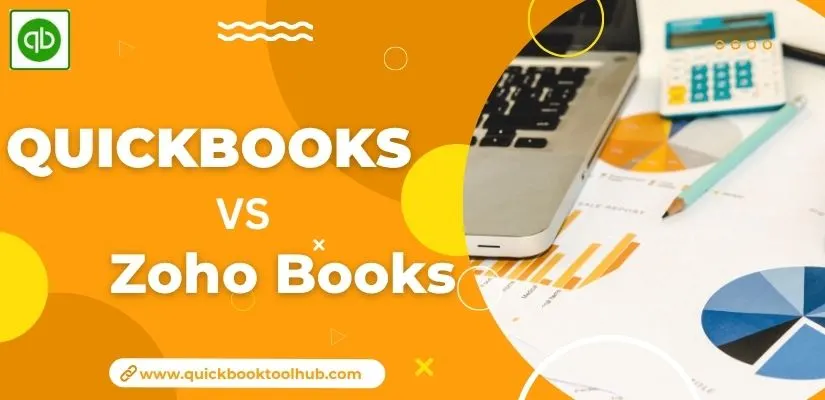
QuickBooks vs Zoho Books are highly used accounting software. QuickBooks is famous for its features, wider integration, and is good for complex businesses. QuickBooks is beneficial for small and mid-sized businesses. Zoho Books is popular for its strong integration, user-friendly interface, and is best suited for international businesses. They both are good online software for businesses but what you choose depends on your business.
What is QuickBooks?
QuickBooks are cloud-based accounting software made by Intuit. It is utilized for small and mid size businesses and also offers a 30 days trial period. It manages finance, track income and expenses. QuickBooks can help you to generate financial reports and provides desktop and online versions.
Key features in QuickBooks:
- Accounting and Bookkeeping
- Expense tracking
- Invoicing
- Payroll Management and Reporting
- Inventory Management
- Online Accessibility
- Extensive Integration
What is Zoho Books?
Zoho Books is used for all sized businesses and provides an end to end accounting experience. It offers a 14-day trial period and it is budget-friendly without any discount. Zoho Books completely automates many accounting tasks which save time and reduce errors.
Key Features in Zoho Books:
- Bank Reconciliation
- Invoicing and Billing
- Expense tracking
- Inventory Management
- Financial Reports
- Multi-user access
- Integrated business platform
- Client Management
Usability and Learning Curve QuickBooks vs Zoho Books
When it comes to usability and learning curve in QuickBooks vs Zoho Books, it depends on user experience, business complexity and experience with accounting software.
Usability in QuickBooks vs Zoho Books
| Feature | QuickBooks | Zoho Books |
| User Interface | Clear but clutter user interface, designed for accounting. | Clear user interface with visual dashboard. |
| Navigate | Feel clutter for new users. | More intuitive and user-friendly. |
| Mobile App | Full featured but user experience is consistent. | Highly rated and consistent user experience. |
| Customization | Improve with higher plans. | Even in lower tier plans. |
| Speed / Response | Can slow down with a big dataset. | Usually faster and more responsive. |
QuickBooks vs Zoho Books has dashboard features, QuickBooks has a customization features.
Learning Curve in QuickBooks vs Zoho Books
| Aspects | QuickBooks | Zoho Books |
| Initial Setup | More complex, particularly with payroll. | Simplified setup and guided set up. |
| Training required | Higher barrier for non accountants. | Simple for small businesses owners to learn on their own. |
| Help resource | Extensive | Smaller collection |
| Support | Chat and phone | Live chat to improve email support. |
Pros & Cons of QuickBooks vs Zoho Books
QuickBooks
Pros:
- QuickBooks has wider use with a large community and it provides features like expense tracking and detailed reporting.
- It is suitable for Small and medium sized businesses and which businesses who grow up ( startup).
- It offers custom workflow and freelancers can grow their business with the help of QuickBooks.
- It has excellent U.S. tax and payroll integration features for state tax filing, W-2s, 1099s.
Cons:
- QuickBooks has limited access for users, if you want to use advanced features then upgrade the plan.
- It is not for begginers who have no knowledge about accounting.
- It is expensive for users who need to use more features in QuickBooks, if they want to use more features then upgrade their plan.
Zoho Books
Pros:
- Zoho Books are cost-effective to users and value for money especially for small businesses.
- Zoho Books are usable for non accountants and it has a user-friendly interface.
- It has a global feature of multi-currancy and localized tax support.
- It has strong integration with other Zoho services e.g like Zoho CRM, Zoho Payroll and Zoho Projects.
Cons;
- Zoho Books is not used for large businesses and it has only few advanced features which is not suitable for large businesses.
- It has no payroll features like QuickBooks and it has few third-party integration apps compared to QuickBooks.
- Zoho Books do not provide more robust and feature packed solutions.
Scalability & Suitability in QuickBooks vs Zoho Books
Choosing the right accounting feature is not about just a feature, it is about the platform that can grow with your business. Scalability and Suitability matter, if you are growing your business when adding new services and entering the market.
QuickBooks
Quickbooks is generally considered for small and mid sized business planning for growth. Its tools are built to expand with you, whether you are a freelancer or have a 25 member team in future.
User Capacity: QuickBooks Online Advance can have up to 25 users, which makes it a good choice for the team.
Built-in payroll: Payroll is built into the QuickBooks to save time and minimize the need for additional tools.
Third-party integration: QuickBooks integrates with almost every prominent business platform.
Zoho Books
Zoho Books is generally for startups, freelancers and companies seeking simplicity without compromising features. It provides a tidy and streamline platform for lean team.
User-friendly Interface: It’s easy to use, making it perfect for business owners who are not accountants.
Free plan: Zoho Books is totally free, so very appropriate for new startups and one person business.
Conclusion
When deciding between QuickBooks vs Zoho Books the answer depends on your business size, budget and long term objective. QuickBooks excels when you require robust, that is capable of evolving with your business. Meanwhile Zoho Books is good for startups, small companies and solo business owners. Ultimately both platforms are a good solution. The best choice depends on how much you care about affordability and simplicity.


